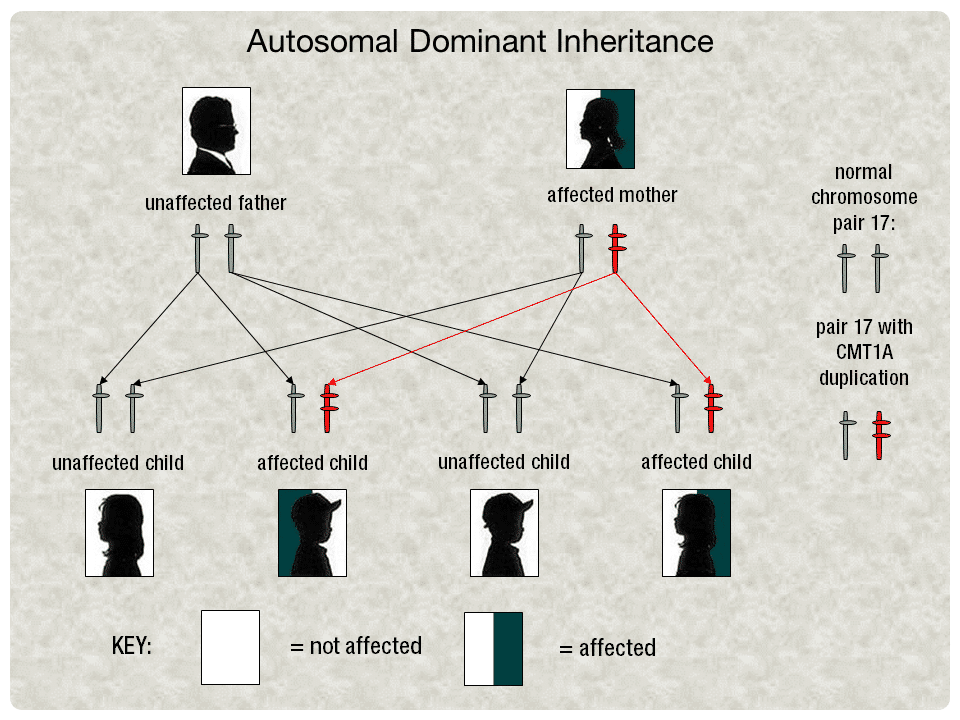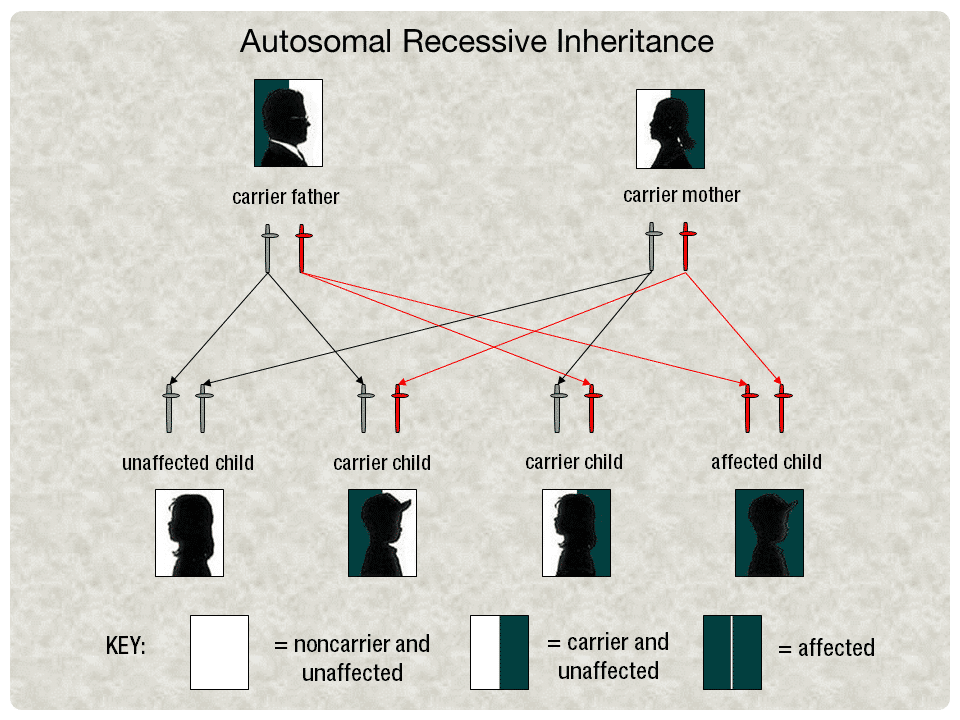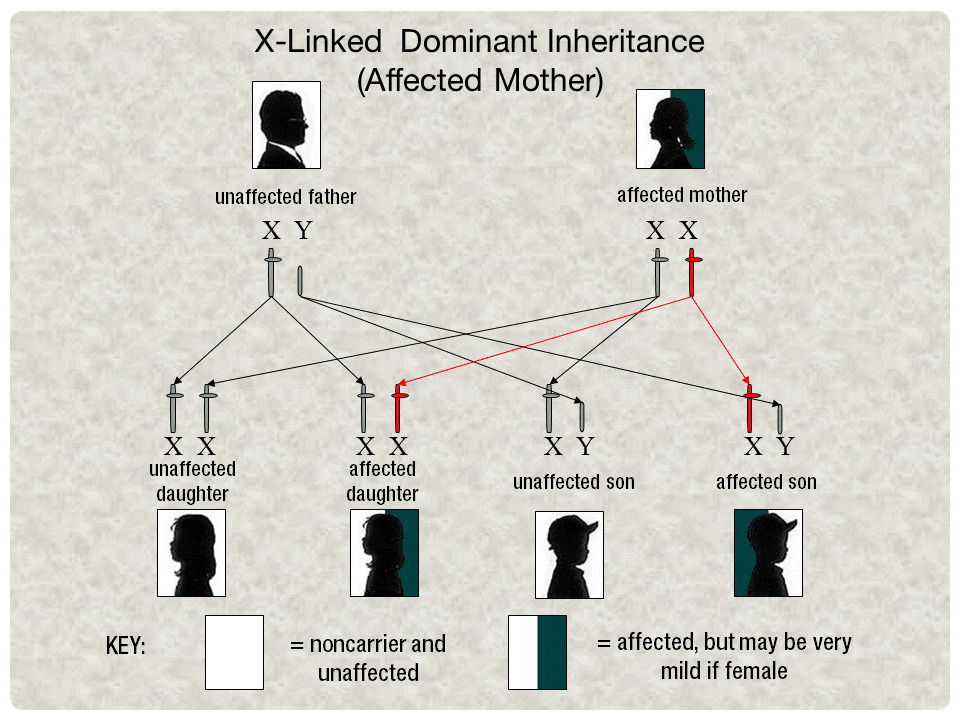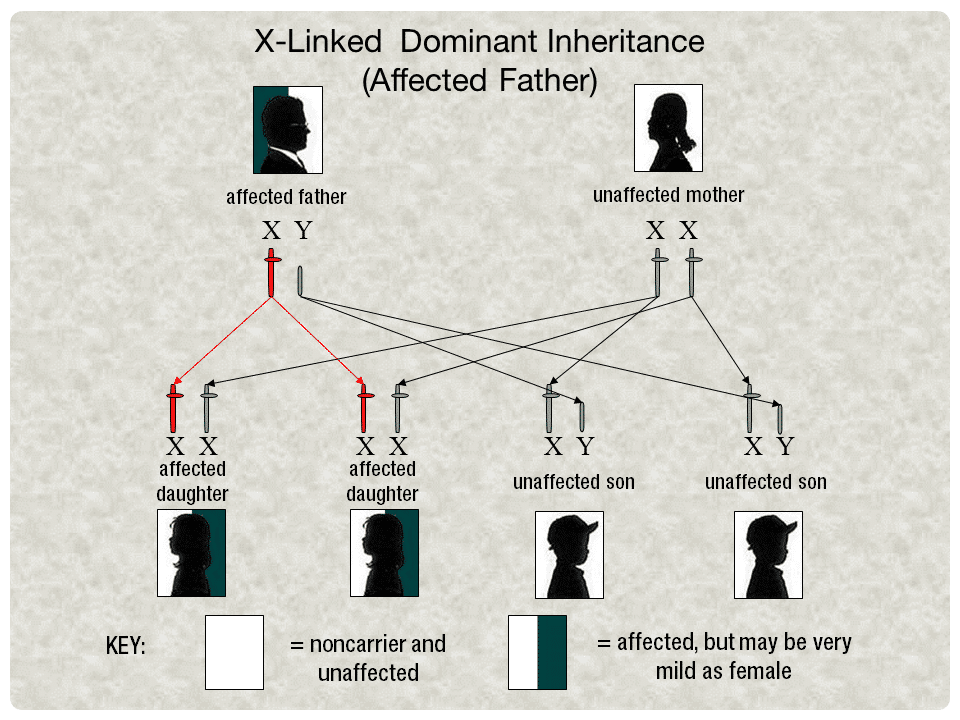Inheritance Patterns and CMT
Knowing which of the forms of CMT you have is important so that you can understand the implications for passing the disease on to your children. The many different forms of CMT are inherited in different ways, so genetic counseling will vary depending on your form of CMT and its mode of inheritance. There are three distinct inheritance patterns that encompass all the many variations of CMT.
Autosomal Dominant Inheritance
 The most common forms of CMT are inherited in an autosomal dominant pattern. Autosomal means that the mutation occurs on a chromosome other than the X or Y chromosome. An affected person has one gene with a mutation and one gene without a mutation in the relevant pair and each child has a 50/50 chance of inheriting the gene with the mutation, giving that person the disorder. Boys or girls have an equal chance of inheriting the disease in this inheritance pattern and an equal chance of passing down the condition. In all autosomal dominant conditions, people affected with the condtion can pass the gene causing CMT to their children, but people without the condition do not have the abnormal gene in their DNA and thus cannot pass CMT on to their children.
The most common forms of CMT are inherited in an autosomal dominant pattern. Autosomal means that the mutation occurs on a chromosome other than the X or Y chromosome. An affected person has one gene with a mutation and one gene without a mutation in the relevant pair and each child has a 50/50 chance of inheriting the gene with the mutation, giving that person the disorder. Boys or girls have an equal chance of inheriting the disease in this inheritance pattern and an equal chance of passing down the condition. In all autosomal dominant conditions, people affected with the condtion can pass the gene causing CMT to their children, but people without the condition do not have the abnormal gene in their DNA and thus cannot pass CMT on to their children.
Autosomal Recessive Inheritance
 The least common forms of CMT in the United States are inherited in an autosomal recessive manner. A person who has a recessive form of CMT is said to have a CMT Type 4. In autosomal recessive forms, a child inherits a copy of a gene with a mutation from both parents. Therefore, the child does not have a properly working copy of the gene. In this type of CMT, both parents have to be “carriers” of the mutated gene before a child can be affected. Neither parent shows signs of any symptoms of CMT, because they have one working copy of the gene. Each parent has to pass down the non-working copy of the gene in order for a child to be affected – therefore there is a 1 in 4 chance of having a child affected with CMT in each pregnancy. Autosomal recessive conditions can affect both males and females.
The least common forms of CMT in the United States are inherited in an autosomal recessive manner. A person who has a recessive form of CMT is said to have a CMT Type 4. In autosomal recessive forms, a child inherits a copy of a gene with a mutation from both parents. Therefore, the child does not have a properly working copy of the gene. In this type of CMT, both parents have to be “carriers” of the mutated gene before a child can be affected. Neither parent shows signs of any symptoms of CMT, because they have one working copy of the gene. Each parent has to pass down the non-working copy of the gene in order for a child to be affected – therefore there is a 1 in 4 chance of having a child affected with CMT in each pregnancy. Autosomal recessive conditions can affect both males and females.
X-Linked Inheritance
 The final form of inheritance is called X-linked. In this form, the gene with the mutation is carried on the X sex chromosome. Women with an X-linked form of CMT usually have less severe symptoms of the condition, though they may show symptoms similar to their male relatives. Likewise, males typically have more severe symptoms than their female relatives. A female who is affected with an X-linked form of CMT has a 50 percent chance of passing down the condition in each pregnancy, no matter the sex of the child. If a child inherits the gene with the mutation, that child will be affected with the condition and will be able to pass it on in future generations. If a child does not inherit the mutation, that child will not have CMT and will not be able to pass it on in the future.
The final form of inheritance is called X-linked. In this form, the gene with the mutation is carried on the X sex chromosome. Women with an X-linked form of CMT usually have less severe symptoms of the condition, though they may show symptoms similar to their male relatives. Likewise, males typically have more severe symptoms than their female relatives. A female who is affected with an X-linked form of CMT has a 50 percent chance of passing down the condition in each pregnancy, no matter the sex of the child. If a child inherits the gene with the mutation, that child will be affected with the condition and will be able to pass it on in future generations. If a child does not inherit the mutation, that child will not have CMT and will not be able to pass it on in the future.
 As males have an X and a Y chromosome, and females have two X chromosomes, there is a difference in the way that the condition is inherited depending on the person who is affected. A male must pass on his Y chromosome in order to have a son. As the gene causing CMT is carried on the X chromosome, a hallmark feature of X-linked inheritance is that fathers do not pass the condition on to their sons. However, since the father needs to pass on his X chromosome in order to have a daughter, all daughters born to a father with an X-linked form of CMT will be affected with the condition. She then will have the 50 percent chance of passing on the condition to a child in each pregnancy, no matter the sex of the child, as explained above.
As males have an X and a Y chromosome, and females have two X chromosomes, there is a difference in the way that the condition is inherited depending on the person who is affected. A male must pass on his Y chromosome in order to have a son. As the gene causing CMT is carried on the X chromosome, a hallmark feature of X-linked inheritance is that fathers do not pass the condition on to their sons. However, since the father needs to pass on his X chromosome in order to have a daughter, all daughters born to a father with an X-linked form of CMT will be affected with the condition. She then will have the 50 percent chance of passing on the condition to a child in each pregnancy, no matter the sex of the child, as explained above.
Spontaneous Mutation
It is also possible for CMT to develop as a result of a new mutation or spontaneous mutation. These cases are called “de novo.” A person who has a new mutation case can then pass the condition on to his/her children.
Genetic Testing and Counseling
Since researchers have found many of the genes and mutations that cause CMT, they have been able to develop genetic tests that offer people information about their specific diagnosis. People consider genetic testing for a variety of reasons. One reason is to confirm a tentative diagnosis of CMT, since early symptoms of CMT can mimic those of other disorders. Another reason for a person with clear signs of CMT to have genetic testing is to enable other family members to determine if they are affected and help them make decisions regarding family planning.
Advice about genetic testing and genetic counseling can be found through the National Society of Genetic Counselors on the Internet at www.nsgc.org. Choose the resource link to find a genetic counselor near you. Genetic counselors can also help to arrange appropriate genetic testing for you.





